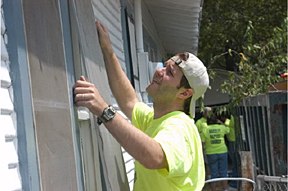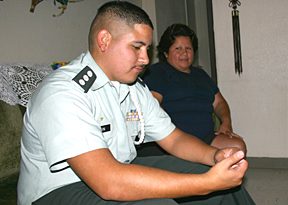LifeWay Family Bible Series for Oct. 24: Jesus brings meaning and purpose to our lives_101804
Posted: 10/15/04
LifeWay Family Bible Series for Oct. 24
Jesus brings meaning and purpose to our lives
Matthew 19:16-30
By Angela Hamm
First Baptist Church, Lewisville
For many Christians, this week's story is a familiar passage of Scripture. We must be careful to not allow our familiarity with the story to hinder us from experiencing truth and change in our lives. God's word is meant to invade our lives and change us from the inside out. We have much to learn from this rich young man.
The story
Jesus was asked by a rich young man what good thing he must do to obtain eternal life. This young man seems to come to Jesus with sincerity. He was really curious to know what he needed to do to receive eternal life.
Jesus addresses the man's presupposition that he can do something good enough to attain eternal life, which is only possible with God. Goodness can be measured only by God because God is the standard of goodness.
 |
The young man asked Jesus what commands he must obey. Jesus responded to the man by citing the essence of the Ten Commandments. The young man was convinced he had kept the commandments and then asked Jesus what he still was lacking. Jesus encouraged the rich young man to sell all he had, give his money to the poor and follow him. When the young man heard Jesus' words, he left because he had many possessions and loved them more than he loved Jesus.
Although the disciples were astonished, the rich young man left without being willing to sell his possessions. Jesus announced it is virtually impossible for a rich man to enter the kingdom of God, yet Jesus taught the disciples that with God all things are possible.
The application
By the world's standards, this young man had it all. Yet he lacked the one thing he could not buy or obtain on his own–real life. Jesus tells us his purpose is to give life in all its fullness (John 10:10). The real life of Jesus gives our lives meaning and purpose.
Jim Collins, in his book “Good to Great,” writes: “Good is the enemy of great. And that is one of the key reasons why we have so little that becomes great. We don't have great schools, principally because we have good schools. We don't have great government, principally because we have good government. Few people attain great lives, in large part because it is just so easy to settle for a good life.”
The rich young man wanted to do something good (19:16), but he had great possessions (19:22). The young man settled for good when he could have had great. In other words, the young man desired a great thing–real life–yet he was unwilling to do a good thing.
Experiencing real life
At the heart of experiencing a real life are the words “follow me.” Experiencing real life comes from following Jesus. Experiencing real life does not come through following a set of rules. It does not come through having a lot of money. It does not come through owning many possessions. Following Jesus is the only way we can experience what real life is all about.
Experiencing real life is all about relationships. We are to grow in our love for God, which results in growing in our love for people. When we desire God more than money or possessions or fame, we will gain the greatest treasure of all.
A young student went to his spiritual teacher and asked, “Teacher, how can I truly find God?” The teacher took his student to a nearby river and invited him to go into the water. When they got to middle of the stream, his teacher said, “Please immerse yourself in the water.” The student went under the water, and immediately his teacher put his hands on his student's head and held him under water. The student began to struggle. His teacher kept holding him under the water. Moments passed, and the student began thrashing the water. Yet the teacher continued to hold him under the water. Finally, the teacher released his student. The student shot up from the water grasping for air. The teacher waited for a few moments and said, “When you desire God as much as you desired to breathe the air you just breathed–then you shall find God.”
What do you desire today? Experiencing real life is a desire to follow God. If an individual has good health, a good home, a good family, wealth, yet never experiences a real life in following God–that individual is just existing.
Jesus offers to give us life in all of its fullness. Let us experience real life and live it out.
Discussion questions
![]() Did anything in this lesson resonate with you?
Did anything in this lesson resonate with you?
![]() IN what areas of your life have you settled for good rather than great?
IN what areas of your life have you settled for good rather than great?
![]() How did the story of the teacher and student relate to your life, especially the last sentence: “When you desire God as much as you desired to breathe the air you just breathed–then you shall find God?”
How did the story of the teacher and student relate to your life, especially the last sentence: “When you desire God as much as you desired to breathe the air you just breathed–then you shall find God?”






